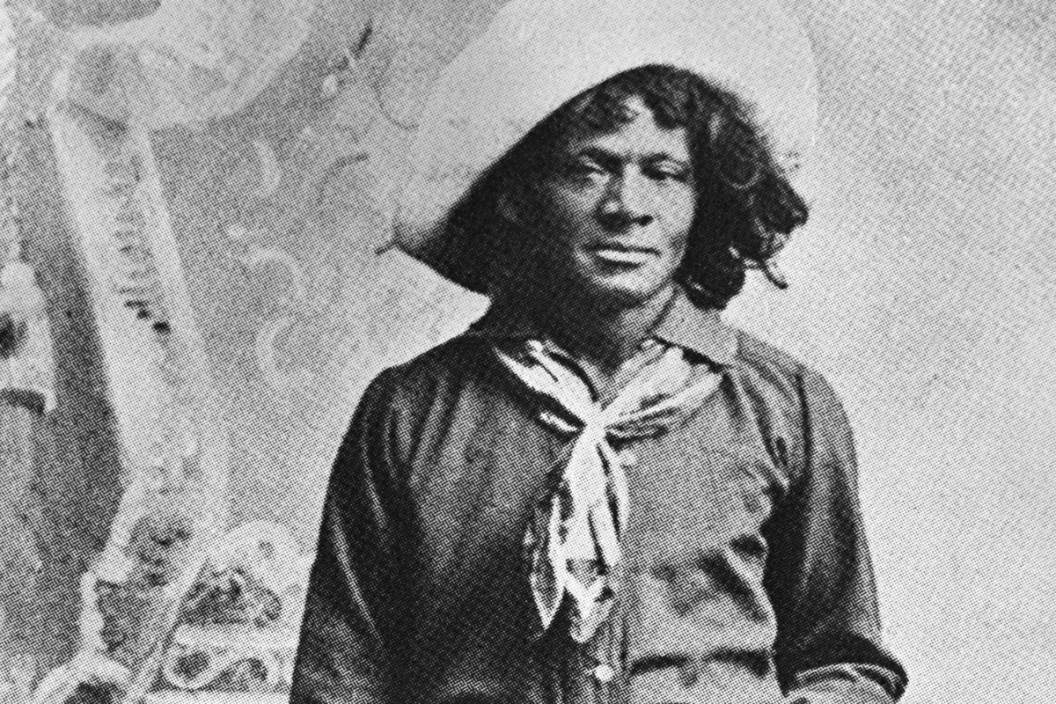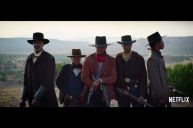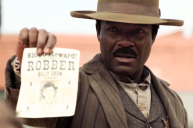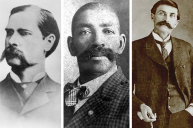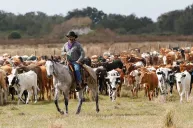Nat Love a.k.a. Deadwood Dick a.k.a. Red River Dick was a cowboy, a pullman porter, a former slave — and a bestselling author. Love's 1907 memoir The Life and Adventures of Nat Love, captivated Americans and cemented his legacy as the frontier's most famous Black cowboy. The 2021 Netflix film The Harder They Fall dramatizes Love's life with theatrical twists... but learn the real story here.
Nat Love's Early Years
Nat Love was born into slavery on Robert Love's plantation in Davidson County, Tennessee around the year 1854. Despite their slave status, Nat's father Sampson encouraged literacy and Nat learned to read and write at a young age. Following the Civil War, Nat's parents remained on the Love plantation as sharecroppers. Soon after, though, Sampson died and Nat left to work nearby as a ranch hand. His talent for breaking horses became immediately clear. After winning money in a raffle, Nat left town for the Great American West. He was just 16 years old.
The Rise of the African-American Cowboy
Centuries of media portrayal have focused on white cowboys, from white-hatted Roy Rogers archetypes to sneering Clint Eastwood antiheroes. But in reality, 25 percent of range-cattle workers during the 1800s were Black. Roughly 20 percent were of Mexican descent. Cowboys of color made up an enormous portion — nearly half — of the cowboy population. This makes sense situated in American history. Seeking cheap land, white Americans moved to Texas in troves throughout the early 19th century. At the time, Texas was Mexican territory. And although the Mexican government opposed slavery, those settlers brought slaves anyway.
This led to the Mexican-American War, after which Texas was annexed to the United States — as a slave state. By 1860, over 30 percent of Texans were slaves. And as white Texans fought to preserve the Confederacy during the Civil War, it was Black slaves who were left to take care of the cattle and the land. Throughout Reconstruction, and after, Black cowboys became integral to the Southwestern economy and lifestyle. In fact, the true statistics on Black cowboys are likely higher than we know; ranch owners could have easily misled census to avoid further taxation.
Love was not from Texas. But his identity as a storied Black cowboy fit into the traditions of his time. He was not an anomaly. At least, not for that reason.
The Exploits of Nat Love
From Tennessee, Love traveled to Dodge City, Kansas, and found cattle drive work at the Duval Ranch near the Texas Panhandle. During that time, Love said he fought off rustlers (cattle thieves) and trained as a marksman. There, he earned the first of his two famous nicknames: "Red River Dick."
In 1872, Love moved to Arizona and worked at the Gallinger Ranch along the Gila River. It was in Arizona that Love crossed paths with local legends like Bat Masterson and Billy the Kid. But soon, Love would become a legend all on his. own. In 1876, he competed as a rodeo contestant in Deadwood, South Dakota, and won competitions in throwing, roping, tying, bridling, saddling and bronco riding. His prowess earned him the nickname "Deadwood Dick," in reference to a popular dime novel character.
Love describes that, and other experiences, in his 1907 memoir The Life and Adventures of Nat Love, Better Known in the Cattle Country as "Deadwood Dick." Although historians debate the factual accuracy of Love's tales, his wild stories have shaped our perception of the Old West. Some extreme accounts from the book include Love's experience with Native Americans. Love writes that he was captured by Pima Indians, endured extensive bullet wounds, and was nursed back to health by the tribe. Through the process, he was welcomed into the Native American tribe and was possibly betrothed to chief Yellow Dog's daughter. But in the end, Love escaped and rode a stolen pony into west Texas. "I felt like I could defy the world," he said of that freeing moment.
Eventually, Love settled down. He retired from cowboy life around the time of his marriage to wife Alice in 1889 and accepted a job with the Denver and Rio Grande Railroad. This work, monitoring sleeping cars, led to a transient lifestyle for Love and his family until, finally, they moved to Los Angeles, California. In his later years, Love published his exciting autobiography and worked as a guard for a securities company. The folk hero died in 1921 at the age of 67.
'The Harder They Fall'
The Netflix film The Harder They Fall, a new school Western with a famous Black cast, draws loose inspiration from Love's own biography. The film dramatizes the rivalry between Love (Jonathon Majors) and the outlaw Rufus Buck (Idris Elba). Along the way, Love and Buck encounter many real-life figures from the Old West, including Stagecoach Mary (Zazie Beetz), rodeo star Bill Pickett (Edi Gathegi), the sharpshooter Jim Beckwourth (R.J. Cyler), and Crawford Goldsby a.k.a. Cherokee Bill (LaKeith Stanfield).
In actuality, however, Love and Buck were not enemies. In fact, they likely never crossed paths! Buck was a notorious criminal who, with the Rufus Buck Gang, briefly terrorized the Oklahoma territory in 1895. By that time, Love was older and had moved on from his rough-riding cowboy days.
So, it's safe to say the Netflix project, directed and co-written by Jeymes Samuel, is taking some creative liberties. Still, we love to see the addition of Love's story to the Western film canon. Particularly, in a film focusing entirely on the Black West. The Harder They Fall is available to stream on Netflix now.
Editor's Note: Products featured on Wide Open Country are independently selected by our editors. However, when you buy something through our links, we may earn a commission.
READ MORE: 5 African-American Cowboys Who Shaped the American West
This article was originally published in July of 2020. It was updated on Nov. 7, 2021.
